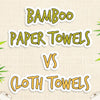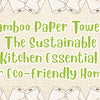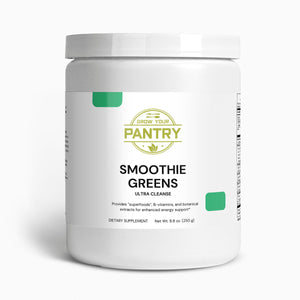Bamboo Paper Towels vs Cloth Towels: A Sustainable Comparison
In recent years, there has been a significant shift towards eco-friendly and sustainable lifestyles, with individuals striving to reduce their environmental footprint. As a part of this movement, people are exploring alternative options to everyday household products, including the humble kitchen towel. Traditionally, paper and cloth towels have been the go-to choices for wiping countertops, drying hands, and soaking up spills in the kitchen. Recently, however, a new contender has joined the fray – bamboo paper towels.
As our awareness of the environmental impact of our choices grows, it's essential to consider the pros and cons of bamboo paper towels versus cloth towels to make informed decisions as consumers. Understanding the production process, longevity, and recyclability or biodegradability of these products allows us to select the option that aligns best with our values and a greener future.
In this comprehensive guide, we will delve into the specifics of both bamboo paper towels and cloth towels, discuss their impact on the environment, evaluate their benefits and drawbacks, and explore what we can do to make our kitchens more sustainable.
With Grow Your Pantry, a UK-based blog and online store that offers products, tips, and resources to grow, ferment, preserve, and cook your food, we strive to inspire greener and more sustainable choices in every aspect of your life. Let's embark on this journey of eco-conscious decision-making together and contribute to a brighter, greener future.
Bamboo Paper Towels: Pros and Cons
Pros:
- Sustainability: Bamboo is an incredibly sustainable resource. It is a grass that can grow as high as 30 meters and regenerate quickly without the need for replanting, making it one of the fastest-growing plants on the planet. It can be harvested within just three to four years of being planted, compared to up to twenty years required for some tree species used to produce traditional paper towels.
- Reduced Deforestation: Due to their rapid growth and replenishment rate, using bamboo as an alternative to traditional wood-based products helps to mitigate deforestation and the subsequent loss of biodiversity. Bamboo production can thus play a role in protecting our forests and counterbalancing climate change.
- Antibacterial and Antifungal Properties: Bamboo contains a natural bio-agent called "bamboo kun", which imparts antibacterial and antifungal properties to the fibres, making bamboo paper towels hygienic for kitchen use.
- Durability and Absorbency: Bamboo paper towels boast high absorbency and are more durable than traditional paper towels due to the long fibres in the bamboo pulp. This means fewer sheets need to be used when cleaning spills or wiping surfaces.
Cons:
- Chemical Treatments: The process of converting bamboo into paper towels may involve the use of chemicals to break down the fibres. However, some manufacturers have adopted eco-friendly processing methods that minimise chemical use and opt for safer alternatives like hydrogen peroxide.
- Cost: Bamboo paper towels can be more expensive compared to regular paper towels, although their durability and reusability generally offset the price difference.
- Composting Limitations: Some types of bamboo paper towels may not be compostable or have limitations in home compost systems due to the presence of bleach, dyes, or residual chemicals. Choose unbleached, dye-free, and chemical-free options to ensure that the towels are suitable for composting.
Cloth Towels: Pros and Cons
Pros:
- Reusability: Cloth towels can be washed and reused multiple times, reducing the need for constant purchases and contributing to less waste.
- Eco-Friendliness: The production of cloth towels, especially those made of organic cotton or other sustainable materials like hemp or bamboo, has a smaller environmental impact than traditional paper towel production. Organic cotton, hemp, or bamboo cloth towels don't involve the use of harmful chemicals or pesticides in their growth, and they require less water.
- Versatility: Cloth towels come in various sizes, designs, and materials, catering to various kitchen needs. They can be used for drying dishes, as napkins, or even as elegant placemats.
- High Absorbency: High-quality cloth towels often have superior absorbency compared to paper towels, making them efficient at cleaning spills and drying surfaces.
Cons:
- Laundry: Cloth towels need to be laundered regularly to maintain their cleanliness and hygiene, which can add to energy and water use. However, washing them with other items in a full load can mitigate the impact.
- Drying Time: Cloth towels typically take longer to dry than paper towels. This can cause inconvenience and may require having multiple cloth towels on rotation.
- Potential Allergens: Some cloth towels may retain allergens and bacteria if not properly washed and dried. Regular sanitising and air-drying can help alleviate this issue.
The Ecological Impact: Comparing the Carbon Footprint
When evaluating the environmental impact of bamboo paper towels and cloth towels, it's important to consider the carbon footprint associated with their production and disposal. While we've already established that both options are greener than traditional paper towels, how do they fare against each other?
According to a life cycle assessment study comparing kitchen towel options, the production of bamboo paper towels generates a higher carbon footprint than cloth towel production. However, the bamboo towels outperform cloth when factoring in washing, drying, and disposal, mainly due to energy and water consumption during the cleaning process.
To minimise the overall carbon footprint associated with cloth towels, here are some suggestions:
- Use towels more efficiently: Reuse your cloth towels by folding and hanging them to maximise their surface area and allow them to air-dry faster.
- Opt for Eco-Friendly Fabrics: Choose cloth towels made from sustainable materials like organic cotton, hemp, or bamboo to reduce the carbon footprint associated with their production.
- Wash and Dry Smartly: Wash cloth towels in cold water and air-dry or choose energy-efficient dryer settings.
Practical Tips for Making the Switch
Embracing a greener lifestyle by swapping traditional paper towels for more sustainable alternatives is an excellent way to reduce our environmental impact. Here are some tips for making the switch seamless:
- Evaluate Your Needs: Determine your specific usage for kitchen towels and select the most appropriate product for your needs. For example, bamboo paper towels for occasional spills and cloth towels for regular wiping and drying.
- Start Small: Transitioning to a new product can take some adjustment. Start by replacing one type of towel in your arsenal and check how it works for you before making a complete switch.
Bamboo Paper Towels: Proper Washing and Care
To get the most from bamboo paper towels, it's important to follow proper washing and care instructions. By extending the life of the towels and maintaining their quality, you will further reduce your environmental impact and make a more economical choice.
- Rinsing: Rinse the bamboo paper towel immediately after use to ensure easy removal of stains and debris. You can rinse it under running water or immerse it in a basin filled with water.
- Pre-soak: If your bamboo paper towel has absorbed oil, grease, or hard-to-remove substances, you may need to pre-soak it in warm water with a mild, environmentally-friendly detergent for a few minutes. This will help loosen the stubborn residue and facilitate a thorough cleaning.
- Hand Washing: Gently hand wash the bamboo paper towel using your fingertips, rubbing any areas with stubborn debris. Avoid applying too much force or twisting as this can damage the fibres and reduce the towel's longevity.
- Machine Washing: While hand washing is generally recommended for bamboo paper towels to extend their lifespan, they can also be machine washed occasionally if needed. Use a gentle cycle with cold or lukewarm water and a mild detergent that is free of bleach and fabric softeners. Washing in a small laundry mesh bag can add protection for the towel.
- Drying: Always air-dry bamboo paper towels. Direct sunlight can provide a natural and effective way of removing any stubborn odours and sanitising the towels, but don't expose them to the sun for too long to prevent degradation. Avoid using a tumble dryer, as the heat can damage the fibres.
- Storage: Ensure the bamboo paper towels are completely dry before folding and storing them neatly to avoid mould or mildew development and to prolong their usability.
Cloth Towels: Proper Washing and Care
Taking good care of cloth towels is essential for optimising their performance, ensuring their durability, and promoting hygiene. Here are some tips for keeping your cloth towels in top condition:
- Pre-treatment: To tackle heavy soiling or grease, soak your cloth towels in warm water mixed with an eco-friendly detergent before washing.
- Washing: Wash your cloth towels with other items that require similar care, such as kitchen linens or bathroom towels. Avoid overstuffing the washing machine to allow for optimal cleaning. Use cold or lukewarm water and an eco-friendly detergent. For extra hygiene, wash your cloth towels every few days or after each use if used to clean surfaces with raw meat or other foods that may cause cross-contamination.
- Drying: Air-dry your cloth towels using a clothesline, drying rack, or heated towel rail. Sunlight can help remove lingering odours and sanitise the towels, but don't leave them in direct sunlight for too long, as this can damage the fabric. Alternatively, use an energy-efficient tumble dryer setting if necessary.
- Folding and Storage: Neatly fold your cloth towels once completely dry and store them in a well-ventilated space to prevent mould or mildew formation.
Choosing the Right Option for Your Household
Selecting the most suitable green alternative to traditional paper towels is dependent on various factors, including your personal preferences, budget, and environmental convictions. Bamboo paper towels might be a better fit for those who prefer a disposable option with similar qualities to paper towels while still being eco-friendly. On the other hand, cloth towels may suit those who prefer a more traditional approach and are willing to invest time into proper towel cleaning and care.
In some cases, combining the use of both bamboo paper towels and cloth towels may be the most efficient way to balance eco-friendliness, convenience, and functionality.
Additional Eco-Friendly Kitchen Habits
In addition to switching to sustainable towel alternatives, adopting other eco-friendly kitchen habits can further contribute to a greener lifestyle. Here are some tips:
- Minimise Single-use Plastic: Replace single-use plastic kitchen items such as cling film and plastic bags with reusable alternatives like beeswax wraps and silicone food storage bags.
- Composting: Start a home compost system to recycle kitchen scraps and turn them into nutrient-rich soil for your plants.
- Energy-saving Appliances: Invest in energy-efficient kitchen appliances with high Energy Star ratings. Additionally, use your appliances efficiently by running full dishwasher loads and using the correct oven temperature.
- Reduce Water Waste: Be mindful of your water usage in the kitchen. Use a plug or a bowl in the sink when washing up and rinse vegetables in a basin rather than under a running tap.
By adopting these eco-friendly practices, you can make a meaningful impact on the environment and contribute to a more sustainable future.
Navigating the Label: What to Look for When Choosing Sustainable Towel Options
A crucial step in making eco-conscious decisions when shopping for bamboo paper towels and cloth towels is understanding and interpreting the product labels. Here are some key factors to look for:
Bamboo Paper Towels:
- Certified Sustainable: Look for bamboo paper towels that are Forest Stewardship Council (FSC) certified to ensure they are sourced from responsibly managed bamboo forests.
- Unbleached: Opt for unbleached bamboo paper towels, as bleaching can involve the use of chlorine, which can release the toxic byproduct dioxin into the environment. Choose products labelled as "chlorine-free" or "unbleached".
- Biodegradable and Compostable: Select bamboo paper towels that are easily compostable and biodegradable in home compost systems. To ensure the product has met international standards for compostability, look for certification labels such as the European "OK compost" or the American "ASTM D6400".
- Low-impact Manufacturing: Some bamboo paper towel manufacturers use environmentally-friendly processes like closed-loop manufacturing, which minimises water waste and recovers chemicals used in the pulping process. Be sure to research the brand's manufacturing practices before purchasing.
Cloth Towels:
- Organic: Choose organic cotton, hemp, or bamboo cloth towels that have been grown without harmful pesticides or synthetic fertilisers. Look for certification labels such as the Global Organic Textile Standard (GOTS) and the Organic Content Standard (OCS).
- Fair Trade: Ensuring fair wages and working conditions for workers involved in the production of your cloth towels is an essential aspect of being eco-conscious. Look for Fair Trade certification, signifying a commitment to fair labour practices.
- Low-impact Dyes: Opt for cloth towels that are dyed using low-impact dyes — dyes that do not contain harsh chemicals and have a better absorption rate, reducing water waste and contamination.
- Recyclable and Biodegradable: Cloth towels made from natural fibres like organic cotton, hemp, or bamboo are more likely to be recyclable and biodegradable, contributing to a circular economy and reducing landfill waste.
Quantifying the Impact: Eco-conscious Purchasing Decisions
Considering the environmental implications of your purchasing choices is essential when transitioning to a more sustainable lifestyle. Assessing the impact of your choices can help quantify the difference you're making and encourage you to make further eco-conscious decisions.
For instance, switching to reusable options such as bamboo paper towels or cloth towels can lead to a significant reduction in paper towel waste. According to a study by The Guardian, the UK used approximately 1.75 billion kilograms of paper towels in 2019. By using bamboo paper towels or cloth towels, you'll contribute to reducing this figure and, in turn, work towards a more sustainable future.
To further quantify the impact, you can calculate a rough estimate of the number of disposable paper towels you're saving by switching. Track your usage of bamboo paper towels or cloth towels and compare the number of sheets used to your previous consumption of traditional paper towels.
Responsible Disposal: Recycling and Composting Towels
Proper disposal of bamboo paper towels and cloth towels is essential to ensure that you're optimising their eco-friendliness and minimising the environmental impact.
For bamboo paper towels:
- Composting: Most bamboo paper towels can be composted, making it an excellent way to dispose of used towels. Ensure that the towels you're using are suitable for home compost systems by checking the label. Chop the towels into smaller pieces to facilitate faster breakdown in the compost heap.
- Recycling: Where composting is not possible, look into recycling options. Some recycling facilities accept certain types of bamboo paper towels for recycling. Check with your local recycling guidelines to find out specific disposal requirements.
For cloth towels:
- Upcycling: Before disposing of your old cloth towels, consider reusing them for other purposes such as dusting cloths or pet bed liners.
- Textile Recycling: If your cloth towel is completely worn out and unusable, dispose of it responsibly by finding a textile recycling facility in your area. These facilities recycle worn textiles into new products, helping to minimise waste and promote
Embracing a Sustainable Lifestyle with Eco-friendly Towel Alternatives
Making the switch to sustainable towel alternatives such as bamboo paper towels and cloth towels is a significant step towards embracing a more eco-conscious lifestyle. By considering the environmental impact of your choices and implementing changes in your daily habits, you can contribute to a greener future. Both bamboo and cloth towels offer practical and eco-friendly alternatives to traditional paper towels, and when cared for and disposed of responsibly, they will help reduce waste and promote sustainability.
At Grow Your Pantry, we are committed to providing eco-friendly products and recommendations that cater to your personal preferences and environmental convictions. Explore our range of sustainable kitchen products, including our selection of bamboo paper towels and cloth towels, to embark on your journey towards a greener lifestyle today.
Are you ready to make the switch to eco-friendly towel alternatives? Visit our online shop now to browse our range of bamboo paper towels and cloth towels, designed to cater for all your household needs while promoting a sustainable future!



